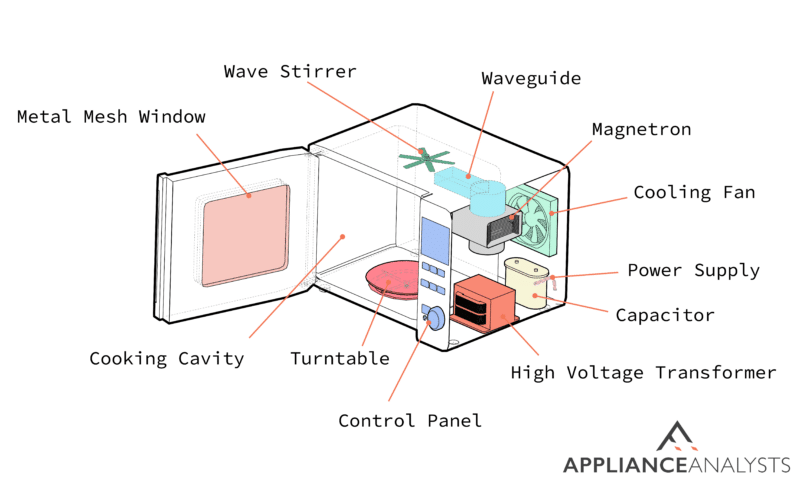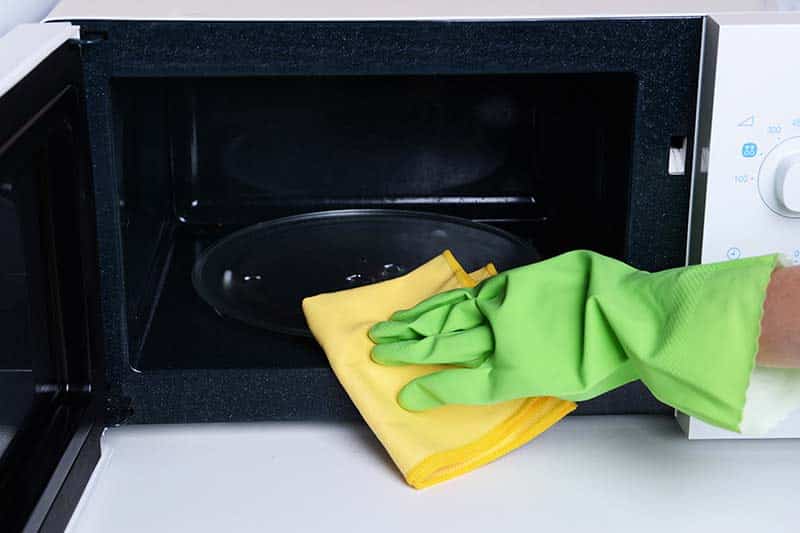Stuck trying to understand the differences between air fryers vs microwaves?
You’re not alone! When it comes to cooking, both appliances have various benefits. But which one is better?
It all depends on several factors, such as your eating habits, the results sought, and your budget.
The main difference between air fryers vs microwaves is their cooking method. Air fryers circulate hot air around the food, while microwaves use electromagnetic waves that heat the water molecules in food, impacting the results and cooking time.
Read on to learn more about other differences between air fryers and microwaves to make the right choice!
Air Fryer vs Microwave: 9 Differences
When choosing between an air fryer vs a microwave, it’s important to consider different factors.
In this section, you’ll learn all the main differences between both appliances to make the right choice for your needs.
#1 Cooking Method
One of the main differences between air fryers and microwaves is their cooking method.
Air fryers are equipped with a component called a “heating element” located at the top of the appliance’s body, next to their fan.
After you turn on your air fryer, the heating element generates heat, which is blown downwards towards your food to cook it. The hot air recirculates throughout the cooking cycle and guarantees evenly fried meals.
But how exactly can hot air create that “deep-fried” finish? Simple, through the Maillard reaction. This chemical process gives fried food and seared steaks their beautiful golden-brown crust.
The extreme dehydration caused by recirculating hot air breaks down your food’s amino acids, sugars, and proteins and gives it that nice finish we all love.
On the other hand, microwaves utilize a magnetron component that generates electromagnetic waves that interact with the water molecules inside your food and accelerate them, thus generating heat.

Some materials, like aluminum and metal, cannot handle these waves, which causes a reaction that can make your microwave spark or even explode. So be careful.
This is, of course, a very summarized explanation of how microwaves and air fryers work. If you want to learn more about the process, you can find all the information you need through a quick Google search. It is fascinating.
#2 Price
Air fryers and microwaves come in various price ranges. As they move up the price tier, you get more features and sleeker designs.
If you’re not looking for anything flashy, you can get a decent microwave oven for $100. However, the price will vary depending on the brand, size, power, and additional features.
Like microwaves, you can also find a basic air fryer that prepares personal-sizes servings for $100. However, you’ll probably be limited by capacity and options.
That said, maybe you don’t need all those extra bells and whistles. In my opinion, if you’re looking for an air fryer that prepares personal-sized servings, you should be more than covered with a basic model. In contrast, if you constantly need to prepare larger batches, an extra $100 could make a night and day difference.
#3 Versatility
I often tell homeowners that when choosing between a microwave vs an air fryer, it’s crucial to consider the versatility.
After all, if you’re already going to spend your hard-earned money on a kitchen appliance, you want it to have as many options for you as possible, right? This is where air fryers could start getting ahead.
While microwaves are great at reheating and cooking your food, you’ll most likely always end up with a bland consistency, which is great for soups and boiled potatoes, but not so much for onion rings, chicken parmesan, or french fries.
Air fryers, on the other hand, can do almost anything. Heating, “frying,” cooking, you name it!
In my opinion, air fryers are extremely versatile. In fact, with the right amount of ingredients and time, it’s quite hard to tell between regular and air-fried foods.
#4 Healthy Recipes
When comparing microwaves vs air fryers, people often ask me which is healthier. Well, this is where air fryers truly shine.
Microwaves are great for heating and cooking your food quickly and conveniently, but a no-grease chicken parmesan recipe will probably not turn out great.
At best, you’ll be left with a mushy, steaming mess.
Air fryers can deliver the same results that deep-frying your favorite foods would bear, in a much healthier version and with a fraction of the oil. You cannot accomplish this with a microwave.

So, if you enjoy a healthy lifestyle and eat delicious foods that are not too caloric, an air fryer is definitely the right pick for you.
#5 Reliability
In my opinion, when it comes to reliability, both microwaves and air fryers are excellent choices.
Technology has come so far that even the most basic options within the $80-$100 price range will deliver the results you would expect without giving you too much trouble.
It would be a lie to say that a microwave is more reliable than an air fryer (or vice-versa), as they both should have relatively long lifespans of optimal functioning, given that they are used under the manufacturer’s indications.
Their reliability applies to reputable international brands, so don’t buy a $40 knock-off to save some money. Remember, buy cheap, buy twice. My advice is to stick with the manufacturers you know and ask your friends or family for recommendations.
Nothing’s as reliable as word of mouth!
#6 Ease of Use
When choosing between an air fryer vs a microwave, it’s also important to consider the ease of use.
Depending on the sophistication of the appliance you buy, it could be easier or harder to use. While most air fryers and microwaves are designed to be as user-friendly as possible, there’s always a learning curve.
This is completely normal.
Besides, we’re not talking about a vacuum sealer, or sous vide accessory to cook a Beef Wellington. It’s just a couple of buttons, waiting, and listening for the beep to know your food’s ready. I’m sure you can get the hang of either option in less than 10 minutes or even less if you check your user manual and read along.
Just keep in mind that more options mean more cooking possibilities, but it also means that you’ll have a very confusing, user-manual read-through session. You can’t win them all!
In my opinion, the ease of use should not be one of the main drivers of your decision, though, especially if you’re looking into basic, cheaper models.
#7 Ease of Cleaning
One main difference between air fryers vs microwaves is their ease of cleaning.
While both appliances are relatively easy to clean and maintain, I find that microwaves demand less of you in this area.

Normally, to take care of your microwave, you need to cover your meals to prevent them from splashing and popping inside your microwave’s chamber and give the tempered glass disk a good wash every couple of days.
Air fryers are a different story, though, as they require you to remove their interior basket after cooking and scrub it well. If there are burned pieces of food stuck to the bottom, removing them can be somewhat challenging.
In my experience, leaving the part to soak in warm water for a few minutes could simplify the process.
Now, I know that having to scrub off any excess food from your air fryer’s basket is neither the end of the world nor extremely challenging, but when compared to maintaining your microwave, it’s definitely a bit more complex.
#8 Safety Features
Now, let’s talk about the differences between air fryers and microwaves regarding safety.
Some fancy microwaves have sensors and components that detect overheating, thus preventing fires and other consequences from accidentally setting your food to cook for 30 minutes instead of 30 seconds.
You want a boiled potato, not a carbonized rock that will set your appliance on fire!
On the other hand, air fryers are much more modern appliances with more safety features. From alarms for overheating and failing fans to failsafe mechanisms that won’t allow the machine to operate if any of its components are improperly placed.
The differences in safety features make sense, as air fryers heat your food and the surrounding areas. In contrast, microwaves only heat the former, thus greatly reducing the risk of burning you.
That being said, both appliances can be safely operated with caution, a pair of gloves, and proper heeding of your manufacturer’s indications.
#9 Durability
When choosing between a microwave vs an air fryer, I always advise homeowners to consider their lifespan.
With proper care, microwaves have the potential to last up to 10 years, showcasing their durability. On the other hand, a well-maintained air fryer typically has a lifespan of about five years.
It’s worth noting that the warranty coverage varies greatly between microwaves and air fryers.
In the case of air fryers, you normally have one year of coverage from factory defects and other issues that can arise from the normal operation of your appliance.
And while this warranty sounds great, when you compare it to your microwave’s whopping ten years on the ceramic inside, the tables turn dramatically.*
*Bear in mind that the warranty duration and coverage can vary significantly based on the manufacturer.
Air Fryers vs Microwaves: Which One Should You Choose?
Choosing between an air fryer and a microwave might sound simple, but it can be very challenging, especially when you’re unsure how one outperforms the other.
With so many options and price ranges out there, the chances of finding one you like are very high, but the defining factors will most likely always be driven by three elements: budget, durability, and versatility.
Ultimately, it all comes down to your lifestyle and the benefits you’re looking to get from your microwave or air fryer.
In an ideal scenario, you should get both, as one will complement the weaknesses and strengths of the other and revolutionize the way you cook daily. That being said, if you only have about $100 to spend on a new appliance, look at your everyday routine and eating habits. You’ll find the right answer there.
If you love healthier alternatives to your favorite snacks, an air fryer will be a godsend. But, if you need quick cooking times, long warranty coverages, and easy appliance maintenance, a microwave will be a lifesaver.
FAQ
Can an Air Fryer Replace a Microwave?
Unfortunately, an air fryer cannot completely replace a microwave because it works in different ways and serves other purposes.
An air fryer circulates hot air around your food, producing crispy and delicious meals. On the other hand, microwaves use electromagnetic waves that heat your food, making them convenient for reheating leftovers or defrosting food.
The cooking results of both appliances are very different due to their distinct cooking mechanisms.
Is It Cheaper to Use an Air Fryer or a Microwave?
The cost of running an air fryer and a microwave will vary depending on their wattage, cooking time, and electricity cost in your area.
In general, air fryers typically use more watts of power compared to microwaves, which can make them less energy-efficient. However, both are generally cheap to run.
Click here to use our free calculator and learn how much it costs to run your microwave!
Microwave vs Air Fryer: Which Is Healthier?
Air fryers are typically healthier than microwaves because they produce healthier versions of fried foods with minimal oil, resulting in a crispy texture.
However, it’s important to note that the healthiness of the food depends on the ingredients you use.
Conclusion
Hopefully, now you know the main differences between an air fryer and a microwave.
Remember, an air fryer uses hot air to cook your food, while a microwave uses electromagnetic waves to generate heat. Air fryers are more versatile and can provide healthier alternatives, while microwaves are faster and typically have longer warranties.
Choose the appliance that best fits your specific needs.
Thank you so much for sticking with me all the way to the end. If you found this article useful, why not check out our other wonderful resources below?
Happy shopping!








